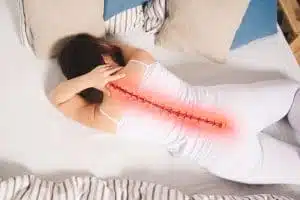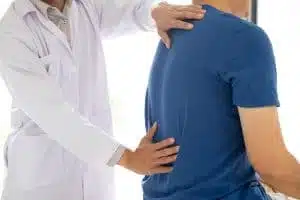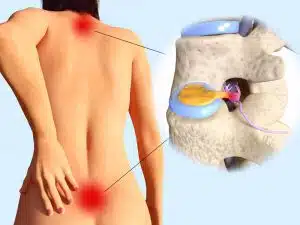Herniated Disc Treatment in The Woodlands and Houston

Bulging discs occur when a section of the outer wall of the disc is weakened due to pressure from the weight above and protrudes beyond the vertebrae. A herniated disc can then occur when there is a tear in the weakened outer wall and it opens up allowing fluid to leak out and irritate the nearby nerves. The disc matter can cause pressure on the nerve which leads to pain down the arm or leg. A herniated disc can be the result of trauma or degeneration.
Symptoms of a Herniated Disc
Approximately, 90% of disc herniations occur in the lower lumbar levels at L4-L5 and L5-S1. Various impingements in the neck can cause pain down the arms, and impingements in the back can cause pain down the legs. Other symptoms associated with a herniation can be weakness and decreased reflexes, along with numbness and tingling in the fingers and toes.
Herniated Disc Treatment Options
In most cases, if your neck or low back pain and referred symptoms from a herniated disc are going to improve, it will start to do so within about six weeks. During this time, several nonsurgical treatment options can assist in the healing process and help reduce the pain and discomfort caused by the herniated disc. The most common nonsurgical treatments include:

- PHYSICAL THERAPY
- CHIROPRACTIC CARE
- POSTURAL CORRECTION
- MEDICATIONS
- INJECTIONS
- TRACTION
If the pain and other symptoms continue beyond six weeks and the pain continues to be severe, or if there is weakness, it is reasonable to consider a surgical opinion to alleviate the symptoms caused by the herniated disc.
Herniated Disc Management
Regular chiropractic treatment (1 visit per month) is recommended for patients once their treatment plan is completed and symptoms have resolved or have become manageable. Due to various stresses on the body (exercise, sports, stress, over-use, gravity, etc.), the spine and joints will compress over time. Regular chiropractic care has been shown to help slow down the degenerative effects on the spine by restoring normal joint movement.
Herniated Disc Q & A
What is a herniated disc?

You have small cushioning discs between each of the vertebrae in your spine. Your spinal discs have a gel-like interior that’s surrounded by a tough, rubbery shell. These discs absorb shock and help your spine twist and bend.
However, as you age, your spinal discs become drier and less flexible, which makes them vulnerable to injuries. Disc herniation happens when the outer shell is weakened or torn, and the gel interior bulges out.
What are the signs of a herniated disc?
It’s possible to have a herniated disc, but not have any symptoms. However, there is very little extra space in your spinal column, and depending on the location of your bulging disc, you might experience nerve compression.

Nerve compression due to a herniated disc causes symptoms that include:
- Back pain
- Radiating pain in your arms, hands, legs, or feet
- Numbness or weakness in your extremities
- Tingling, aching, or burning sensations in your back or extremities
Your pain and other symptoms might be more intense at night or with specific movements that exacerbate the nerve compression. You might also feel like your pain is worse when you sit or stand for a long time or after walking.
How is a herniated disc diagnosed?
The symptoms of disc herniation are relatively unique, and your provider at Houston Spine & Rehabilitation Centers can usually identify your condition by your description of your symptoms. Nonetheless, they complete physical exams that might include some gentle stretches to confirm your diagnosis.
Your provider might also order X-rays or MRIs to pinpoint the location of your herniated disc and identify any other issues that could contribute to your symptoms.
How are herniated discs treated?
The team at Houston Spine & Rehabilitation Centers provides customized treatment plans to address your specific needs. Your program could include:

- Physical therapy
- Chiropractic care
- Aquatic therapy
- Postural correction
- Spinal decompression
- Medications
- Spine injections
- Traction
If your pain and other symptoms don’t subside within six weeks of treatment, the team can refer you to a trusted orthopedic surgeon to find out if surgery is necessary to heal your spine.
Call Houston Spine & Rehabilitation Centers or make an appointment online today for expert assessments and herniated disc treatment in The Woodlands and Houston.